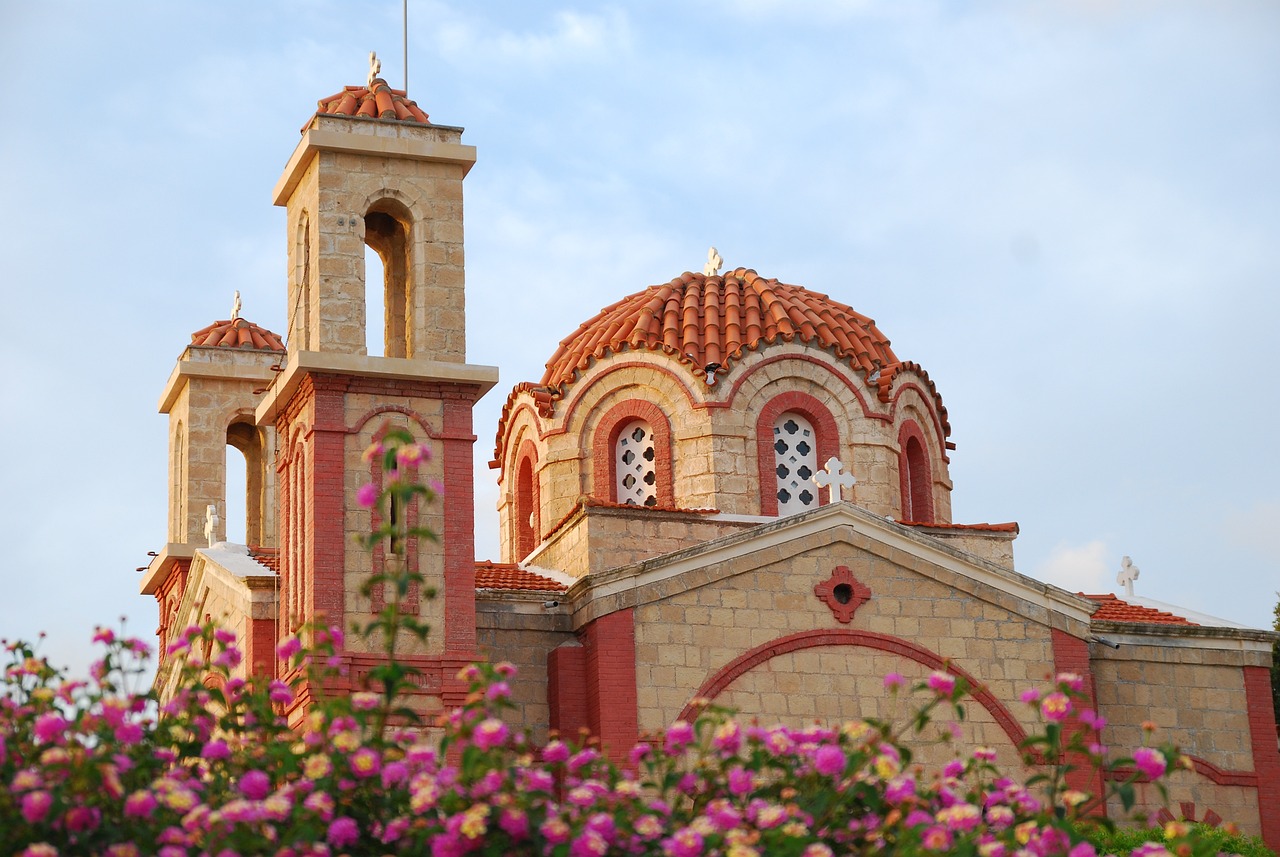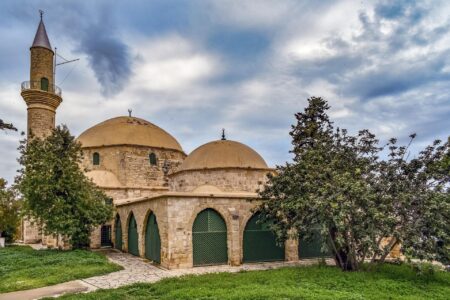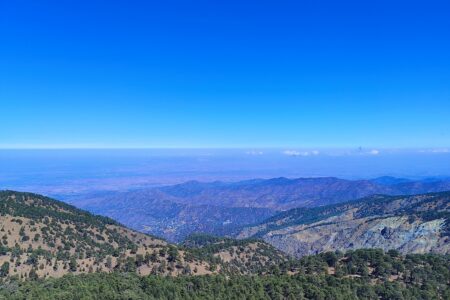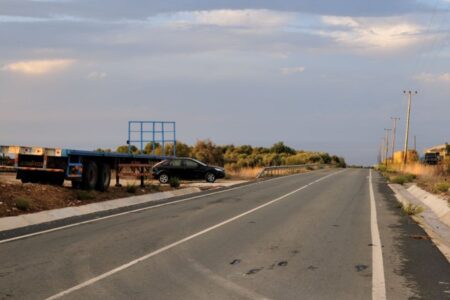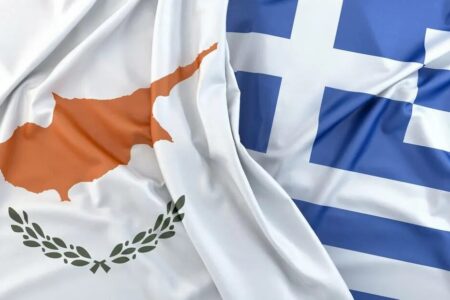For centuries, Cyprus has been a crossroads of cultures and beliefs, creating a unique atmosphere of spirituality. Today, it is known for its religious freedom and peaceful coexistence of various faiths.
Contents
- 1 The History of Religions on the Island
- 2 Greek Orthodox Church
- 3 Russian Orthodox Church
- 4 Islam in Cyprus
- 5 Other Christian Denominations
- 6 Judaism
- 7 Buddhism and Hinduism
- 8 Religious Festivals and Traditions
- 9 Religion and Education
- 10 Influence on Culture and Art
- 11 Interfaith Dialogue
- 12 Religion and Modern Society
- 13 Religious Tourism
- 14 Legislation and Freedom of Religion
- 15 The Future of Religious Diversity
The History of Religions on the Island
Since ancient times, Cyprus has been a meeting point of civilizations. Before Christianity, the island worshiped Greek gods. However, in the 1st century AD, Christianity began spreading thanks to Apostles Paul and Barnabas. Since then, Cyprus’s religious landscape has continually evolved.
Greek Orthodox Church
Most Greek Cypriots are Greek Orthodox Christians. The church plays a central role in the island’s cultural and social life. Orthodox rituals and festivals are widely celebrated, and numerous churches and monasteries form an integral part of the landscape.
History and Influence
Orthodoxy in Cyprus has deep roots. Despite Ottoman and British rule, the church retained its influence. For instance, the Kykkos Monastery, established in the 11th century, is famous for its icon of the Virgin Mary and attracts many pilgrims.
Religious Festivals
Easter is the most important celebration for Orthodox Cypriots. Preparations begin with Lent, and Easter itself is marked by special services and traditions. Christmas and other holy days are also celebrated on a grand scale.
Russian Orthodox Church
In recent years, the Russian-speaking community in Cyprus has grown significantly. Consequently, the Russian Orthodox Church has expanded its presence, providing spiritual support and services for Russian-speaking believers.
Churches and Parishes
The Russian Orthodox Church has opened parishes in several cities. In Limassol, the Church of St. Nicholas has become a spiritual center. Churches in Nicosia, Larnaca, and Paphos also hold regular services in Russian.
Activities and Events
Services are conducted in Church Slavonic and Russian. Sunday schools teach children the basics of Orthodoxy and the Russian language. The church also organizes cultural events, including concerts and exhibitions.
Role in the Community
The Russian Orthodox Church plays an important role in preserving cultural and religious identity among Russian-speaking Cypriots. It also helps new immigrants adapt to life on the island by offering support and guidance.
Interfaith Relations
The Russian Orthodox Church maintains friendly relations with the Greek Orthodox Church in Cyprus. Joint events and exchanges strengthen spiritual ties, reflecting shared Orthodox roots and mutual respect.
Islam in Cyprus
Turkish Cypriots predominantly follow Sunni Islam. Despite the island’s political division, the Muslim community preserves its traditions and customs. Mosques serve as both religious and social centers.
Historical Context
Islam arrived in Cyprus in the 16th century with the Ottoman Empire. Since then, the Muslim community has been an integral part of Cypriot society. Mosques like Lala Mustafa Pasha in Famagusta are significant cultural landmarks.
Holidays and Customs
Ramadan and Eid al-Adha are key celebrations for the Muslim community. During Ramadan, fasting is observed, and Eid al-Adha involves sacrifices and charitable acts.
Other Christian Denominations
In addition to Greek and Russian Orthodoxy, other Christian denominations enrich the island’s religious landscape.
Armenian Apostolic Church
The Armenian community in Cyprus traces its roots back to the 13th century, when Armenians fled Mongol invasions. Today, the community numbers a few thousand and actively preserves its cultural and religious traditions.
Churches and Parishes
The Church of the Holy Mother of God (Sourp Asdvadzadzin) in Nicosia serves as the main spiritual center. It hosts religious services and cultural events dedicated to Armenian language, music, and art.
Education and Culture
An Armenian school operates within the church, teaching children their native language and history. The community organizes festivals and concerts, attracting locals and tourists alike.
Maronite Church
Maronites are an Eastern Catholic community historically tied to Lebanon. They have been present in Cyprus since the Crusades and number around 6,000 people.
Villages and Churches
Maronites mainly live in villages like Kormakitis, Asomatos, Karpasha, and Ayia Marina. Despite the island’s division, they maintain ties to their historical lands. Churches like Panagia Chariton serve as spiritual centers.
Preserving Identity
The community actively works to preserve its unique Maronite Arabic dialect. They also organize cultural events to maintain their traditions.
Roman Catholic Church
The Roman Catholic Church in Cyprus unites locals and expatriates from various countries. It plays a significant role in the spiritual lives of many foreigners living on the island.
Churches and Services
Catholic Masses are held in cities like Nicosia, Limassol, and Larnaca. Services are conducted in multiple languages, including English, Greek, and Polish, to accommodate a diverse congregation.
Social Activities
The Catholic Church engages in charity, helping those in need and supporting social projects. It also promotes cultural exchange among different nationalities.
Protestant Churches
Protestant communities in Cyprus include the Anglican Church, Greek Evangelical Church, and others. They bring together locals and expatriates.
Anglican Church
The Anglican Church has parishes in Nicosia, Limassol, and Paphos. Services in English are open to everyone. The church organizes events and meetings for expatriates.
Greek Evangelical Church
Operating in cities like Nicosia and Limassol, this church offers services, Bible studies, and youth programs. It promotes spiritual growth and social engagement among its members.
International Communities
German evangelical churches also hold services on the island, providing support for German-speaking residents and tourists.
Judaism
The Jewish community in Cyprus is small but active. A synagogue in Larnaca, part of the Jewish Community Center, serves as both a religious and cultural hub.
Community Activities
The synagogue hosts regular religious services, Jewish holiday celebrations, and educational programs. The center also fosters connections between Cypriot Jews and global Jewish communities.
Historical Context
Judaism in Cyprus dates back to ancient times. Today, the community continues its traditions and contributes to the island’s cultural diversity.
Buddhism and Hinduism
With the growing number of immigrants and expatriates from Asia, Buddhist and Hindu communities have emerged in Cyprus.
Buddhist Centers
Buddhist centers offer meditation and spiritual practices. They host retreats and workshops, enriching participants’ spiritual experiences.
Hindu Temples
Hindu communities celebrate festivals like Diwali and Holi. These events are open to the public, encouraging cultural exchange.
Religious Festivals and Traditions
Religious festivals play a central role in the lives of Cypriots, bringing together people of different faiths.
Orthodox Traditions
Easter is marked by processions and night services that gather large crowds. Christmas involves family gatherings, home decorations, and church visits.
Muslim Customs
During Ramadan, the Muslim community observes fasting from dawn to sunset. Eid al-Adha includes sacrifices and charity, strengthening social bonds.
Religion and Education
Religious education is an integral part of the Cypriot school curriculum.
School Education
Children learn the basics of their faith as part of mandatory subjects. Programs also include information about other religions to promote tolerance and understanding.
Sunday Schools
Many religious communities run Sunday schools, offering additional education aligned with their traditions.
Influence on Culture and Art
Religion has profoundly influenced Cyprus’s art and culture.
Architecture
Churches, monasteries, and mosques are remarkable examples of architectural heritage. The Stavrovouni Monastery, one of the oldest on the island, is known for its unique design and history.
Art and Music
Religious themes are prominent in iconography and frescoes. Traditional music often includes spiritual motifs, reflecting the richness of the island’s heritage.
Interfaith Dialogue
Interfaith dialogue thrives on Cyprus, fostering cooperation between religious communities.
Joint Events
Religious leaders and communities organize conferences, seminars, and cultural events to promote mutual understanding and peace.
Peace Initiatives
In the context of the island’s political division, religious leaders play a vital role in promoting reconciliation and trust.
Religion and Modern Society
Religion remains a significant part of contemporary life in Cyprus.
Family Rituals
Baptisms, weddings, and funerals are accompanied by religious ceremonies, emphasizing the importance of tradition in family life.
Charity
Religious organizations actively participate in charitable work, supporting vulnerable groups and funding healthcare and education projects.
Religious Tourism
Cyprus is a popular destination for religious tourism.
Popular Routes
Kykkos Monastery, known for its miraculous icon of the Virgin Mary, attracts thousands of pilgrims annually. St. Lazarus Church in Larnaca, built in the 9th century, is another key pilgrimage site.
Cultural Enrichment
Religious sites offer unique insights into the island’s history and culture. Visitors can explore diverse shrines, reflecting Cyprus’s rich spiritual heritage.
Legislation and Freedom of Religion
The Constitution of Cyprus guarantees freedom of religion for all residents.
Legal Protection
The state safeguards the rights of religious communities and ensures equal opportunities for practicing faith. Laws aim to prevent discrimination and promote tolerance.
Preserving Heritage
Authorities support the preservation and restoration of religious monuments, recognizing their cultural and historical importance.
The Future of Religious Diversity
Globalization and migration continue to introduce new religious communities to Cyprus.
Enriching Society
The influx of new cultures and beliefs enriches the social and spiritual landscape. This creates opportunities for cultural exchange and mutual understanding.
Challenges and Prospects
Despite challenges related to integration, Cypriot society demonstrates its ability to embrace diversity. This is expected to strengthen tolerance and cooperation among communities.
Religion in Cyprus reflects its complex history and rich cultural influences. Tolerance and mutual respect allow various faiths to coexist peacefully and contribute to the common good. Visiting Cyprus offers not only the chance to enjoy its natural beauty but also to explore its
Note: Visitors to religious sites in Cyprus should respect local customs, dress modestly, and seek permission before taking photographs.

